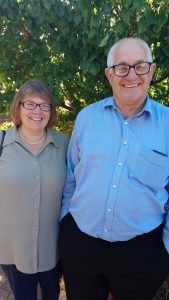Everything that Jesus said in the Sermon on the Mount is so important, but these words of Jesus in Matthew 7:13-14 seem to have much more importance and weight than the rest. Why is that? Because eternity hangs on what Jesus said in these verses. The outcome of our response to what He said will either be heaven or hell. There is no in-between. And so what He said is so vital.
Sermons
‘Love matters’ (1 Peter 1:22-23)
 The church of today is under the microscope. Recent events that have brought discredit to the name of our Saviour and a trend towards marginalising the Christian faith within our nation, has meant that more than ever, what we do and say as God’s people matters. And that is why love also matters, because love is the key to our witness to the world. Jesus said this in John 13:35 and Peter reinforced this in 1 Peter 1:13-25. Not just the world’s definition of love, but the love that springs from knowing the God who has loved and loves His people.
The church of today is under the microscope. Recent events that have brought discredit to the name of our Saviour and a trend towards marginalising the Christian faith within our nation, has meant that more than ever, what we do and say as God’s people matters. And that is why love also matters, because love is the key to our witness to the world. Jesus said this in John 13:35 and Peter reinforced this in 1 Peter 1:13-25. Not just the world’s definition of love, but the love that springs from knowing the God who has loved and loves His people.
(Message by PCV Moderator, Rev Robert White, pictured here with his wife, Sue)
‘Ministry with the mighty, merciful Messiah’ (Matthew 14:13-21)
The miracle of Jesus’ feeding of the multitudes is one that is found in all of the gospels. It served as a sign that he was Israel’s Messiah, the living Bread, who came down from heaven. In this message on that miracle found in Matthew 14:13-21, Chris explores what the miracle might have meant for the disciples back then and for disciples in this age. What attitude is required for us to be able to do ‘ministry’? And what is that we learn most of all about the one who was able to feed the multitude, but also said, “You give them something to eat”? (Sorry, sound quality not that great!)
‘The rights and wrongs of the Lord’s ‘general’ rule’ (Matthew 7:12)
A lot of people have made far too much of what is called the ‘Golden rule’ found in Matthew 7:12. While this verses is important in the whole context of all that Jesus said and taught, it is not, nor was it ever, the be-all and end-all of His teaching. The Golden rule can never save us – only God can do that! However, the Godlen rule does remain an important expression of what it means to ‘love our neighbour’ as God’s Word consistently teaches us. The danger comes when we place the Golden rule as the most important and neglect to love God (the first and greatest commandment).
“Ask, seek and knock: What an incentive to pray!” (Matthew 7:7-11)
After instructing His disciples on how to avoid being careless in making evaluations of one another and then how to be careful with His Word and so make wise judgments, in Matthew 7:7-11, he then spoke about prayer. While it may at first glance seem that there is no connection between what Jesus had been saying in the previous verses and these ones, the connection is there and it is a strong one. If we are ever going to come close to doing what Jesus taught in verses 1-6, we’re also going to have to do verses 7-11 very well!
‘There is a time to judge! There is no question!’ (Matthew 7:6)
After Jesus warned his disciples to be careful of passing judgment on one another (Matthew 7:1-5), Jesus went on in Matthew 7:6 to say some words that are a little bit harder to understand. What is it about pigs and dogs that we must take note of? And, what did he mean by warning us ‘to be careful with what we do with our ‘pearls’? HIs words are weighty and they require some thought and some application!
‘To judge or not to judge; that is the question!’ (Matthew 7:1-5)
The words of the Lord Jesus in the Sermon on the Mount found in Matthew 7:1-5 are heavy and soul-searching, but they also require a great deal of thought and consideration if they are to be put into practise. These words have been misunderstood over time and probably also badly applied, but this does not excuse us from tackling both their implications and their correct application – which again (like so much in the Sermon on the Mount) is a matter of the heart.
What is the gospel?’ Ryan Smith
In this message, Ryan Smith explores the vital question of ‘What is the Gospel?’ from 1 Corinthians 15:1-8.
‘Time and Eternity’ Rev Len Pearce
As we enter another year of time, we all face eternity. Where are we headed? Rev Len Pearce asks and answers those questions in this message based on Isaiah 57:11-24 and Matthew 25:31-46.
‘An end-of-year text for the year ahead’ (Romans 11:33-36)
In this great doxology from the pen of the Apostle Paul in Romans 11:33-36, we find how Paul gave glory and praise to God because of certain aspects of His character, namely His wisdom and knowledge. As we come to the end of the year and with uncertainty ahead of us, it’s good to be reminded that God knows more than we do and is able to be trusted in all that He has promised.